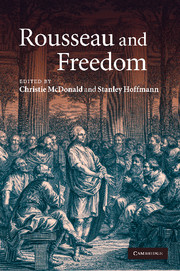Book contents
- Frontmatter
- Contents
- List of illustrations
- Notes on contributors
- Acknowledgments
- List of abbreviations
- Introduction
- PART I
- 1 Freeing man from sin: Rousseau on the natural condition of mankind
- 2 Making history natural in Rousseau's Discourse on the Origins of Inequality
- 3 Rousseau's Second Discourse: between Epicureanism and Stoicism
- 4 Jean-Jacques Rousseau and Diderot in the late 1740s: satire, friendship, and freedom
- 5 If you please! Theater, verisimilitude, and freedom in the Letter to d'Alembert
- 6 Music, the passions, and political freedom in Rousseau
- PART II
- PART III
- Bibliography
- Index
1 - Freeing man from sin: Rousseau on the natural condition of mankind
Published online by Cambridge University Press: 05 May 2010
- Frontmatter
- Contents
- List of illustrations
- Notes on contributors
- Acknowledgments
- List of abbreviations
- Introduction
- PART I
- 1 Freeing man from sin: Rousseau on the natural condition of mankind
- 2 Making history natural in Rousseau's Discourse on the Origins of Inequality
- 3 Rousseau's Second Discourse: between Epicureanism and Stoicism
- 4 Jean-Jacques Rousseau and Diderot in the late 1740s: satire, friendship, and freedom
- 5 If you please! Theater, verisimilitude, and freedom in the Letter to d'Alembert
- 6 Music, the passions, and political freedom in Rousseau
- PART II
- PART III
- Bibliography
- Index
Summary
Men are wicked; a sad and constant experience makes proof unnecessary; yet man is naturally good, I believe I have proved it.
Jean-Jacques RousseauIn 1753, the Academy of Dijon wondered, “What is the origin of inequality among men?” and “whether it is authorized by natural law.” Surprised by the Academy's audacity, Rousseau took it upon himself to respond with a treatise so much longer than what the Academy had asked for, that his entry was dismissed without being read in its entirety by the jury. The length of what came to be known as the Second Discourse, however, is not its only curious characteristic. This work is extraordinarily fragmented: according to Rousseau's own divisions of the text, it consists of (1) an epistle dedicatory; (2) a preface; (3) an exordium; (4) Part i; (5) Part ii; and (6) Rousseau's notes. In addition to these parts, the reader is faced with a frontispiece, a title page which contains a second picture and an epigraph from Aristotle's Politics, a rather curious note on the notes, as well as an explicit challenge to choose the correct path through the work, and thereby avoid joining the ranks of the “vulgar Readers.” These structural curiosities, in turn, house certain well-known substantive oddities, the most notorious of which is the relationship between Part i and Part ii of the Discourse. Therein, Rousseau proposes to seek out natural man by means of an extended examination of his natural condition.
- Type
- Chapter
- Information
- Rousseau and Freedom , pp. 9 - 23Publisher: Cambridge University PressPrint publication year: 2010
- 1
- Cited by



